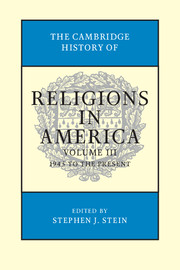Book contents
- Frontmatter
- SECTION I THE POSTWAR RELIGIOUS WORLD, 1945 AND FOLLOWING
- SECTION II CONTROVERSIAL ISSUES IN TRANSITIONAL TIMES
- 7 Secularization in American Society: A Review of the 1960s
- 8 Breaking Silence: Churches and Opposition to the Vietnam
- 9 The Religious Significance and Legacy of the Civil Rights Movement, 1950–1970
- 10 The Kennedy Election: The Church-State Question and Its Legacy
- 11 “Love is the Only Norm”: The New Morality and the Sexual Revolution
- 12 Second Vatican Council
- 13 The State of Israel
- SECTION III THE WORLD’s RELIGIONS IN AMERICA
- SECTION IV RELIGIOUS AND CULTURAL CONFLICT IN AMERICA
- SECTION V NEW AND CONTINUING RELIGIOUS REALITIES IN AMERICA
- SECTION VI CONCLUDING ESSAYS
- Index
- References
10 - The Kennedy Election: The Church-State Question and Its Legacy
from SECTION II - CONTROVERSIAL ISSUES IN TRANSITIONAL TIMES
Published online by Cambridge University Press: 28 July 2012
- Frontmatter
- SECTION I THE POSTWAR RELIGIOUS WORLD, 1945 AND FOLLOWING
- SECTION II CONTROVERSIAL ISSUES IN TRANSITIONAL TIMES
- 7 Secularization in American Society: A Review of the 1960s
- 8 Breaking Silence: Churches and Opposition to the Vietnam
- 9 The Religious Significance and Legacy of the Civil Rights Movement, 1950–1970
- 10 The Kennedy Election: The Church-State Question and Its Legacy
- 11 “Love is the Only Norm”: The New Morality and the Sexual Revolution
- 12 Second Vatican Council
- 13 The State of Israel
- SECTION III THE WORLD’s RELIGIONS IN AMERICA
- SECTION IV RELIGIOUS AND CULTURAL CONFLICT IN AMERICA
- SECTION V NEW AND CONTINUING RELIGIOUS REALITIES IN AMERICA
- SECTION VI CONCLUDING ESSAYS
- Index
- References
Summary
Early in 1959, when it was becoming more obvious that Senator John F. Kennedy was a probable candidate for president, Protestants and Other Americans United for the Separation of Church and State (POAU) demanded that each candidate declare himself in regard to appointing an ambassador to the Holy See and on aid to parochial schools. Kennedy declared his opposition to appointing an ambassador to the Holy See on the grounds that the divisiveness resulting from such a nomination would undermine any ambassador’s effectiveness at the Vatican. In regard to aid to parochial schools, he declared that he was bound to uphold the Supreme Court’s prohibition of such aid. The senator went on to say, “Whatever one’s religion in his private life may be, for the officeholder, nothing takes precedence over his oath to uphold the Constitution and all its parts – including the First Amendment and the strict separation of church and state.” Kennedy’s position drew attacks from America, the Jesuit weekly magazine, and Commonweal, the lay-edited weekly, as well as from other Catholic papers. All these journals noted that only the Catholic candidate had to explain his religious beliefs. America, in particular, chastised Kennedy for making “efforts to appease bigots” and for saying “nothing takes precedence over his oath to uphold the Constitution,” and it argued that “no religious man, be he Catholic, Protestant or Jew, holds such an opinion. A man’s conscience has a bearing on his public as well as his private life. Kennedy would later nuance his position, as will be seen, when he was actually the Democratic nominee for president. His statement and his subsequent campaign occurred in the midst of a separate, but related discussion among American Catholic theologians about whether Catholics could support the American separation of church and state and advocate religious liberty.
- Type
- Chapter
- Information
- The Cambridge History of Religions in America , pp. 205 - 223Publisher: Cambridge University PressPrint publication year: 2009



